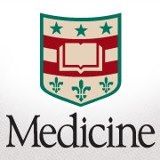WASHINGTON UNIVERSITY SCHOOL OF MEDICINE

- Country
- 🇺🇸United States
- Ownership
- Private, Subsidiary
- Established
- 1891-01-01
- Employees
- 10K
- Market Cap
- -
Clinical Trials
1.7k
Trial Phases
6 Phases
Drug Approvals
2
Drug Approvals
Clinical Trials
Distribution across different clinical trial phases (1433 trials with phase data)• Click on a phase to view related trials
AI-driven Clinical Decision Support for Perioperative Blood Orders
- Conditions
- Surgery
- First Posted Date
- 2025-11-03
- Last Posted Date
- 2025-11-04
- Lead Sponsor
- Washington University School of Medicine
- Target Recruit Count
- 50
- Registration Number
- NCT07223853
- Locations
- 🇺🇸
Washington University / Barnes Jewish Hospital, St Louis, Missouri, United States
Low-Count Quantitative SPECT for Men Treated With Radium-223
- Conditions
- Prostate CancerCancer of the Prostate
- First Posted Date
- 2025-10-28
- Last Posted Date
- 2025-10-30
- Lead Sponsor
- Washington University School of Medicine
- Target Recruit Count
- 38
- Registration Number
- NCT07221825
- Locations
- 🇺🇸
Washington University School of Medicine, St Louis, Missouri, United States
Transcutaneous Auricular Vagus Enhanced Recovery in the NeuroICU
- Conditions
- Acute Neurological InjuryAcute Medical Conditions
- First Posted Date
- 2025-10-21
- Last Posted Date
- 2025-10-21
- Lead Sponsor
- Washington University School of Medicine
- Target Recruit Count
- 160
- Registration Number
- NCT07219108
- Locations
- 🇺🇸
Washington University School of Medicine, St Louis, Missouri, United States
Eating Disorder Chatbot Optimization
- Conditions
- Eating Disorders
- First Posted Date
- 2025-10-20
- Last Posted Date
- 2025-10-22
- Lead Sponsor
- Washington University School of Medicine
- Target Recruit Count
- 800
- Registration Number
- NCT07218302
- Locations
- 🇺🇸
Washington University in St. Louis, St Louis, Missouri, United States
Pain in Juvenile Arthritis
- Conditions
- Juvenile Idiopathic Arthritis
- First Posted Date
- 2025-10-16
- Last Posted Date
- 2025-10-16
- Lead Sponsor
- Washington University School of Medicine
- Target Recruit Count
- 140
- Registration Number
- NCT07217782
- Locations
- 🇺🇸
Washington University School of Medicine, St Louis, Missouri, United States
- Prev
- 1
- 2
- 3
- 4
- 5
- 342
- Next
News
Merus' Petosemtamab Phase 2 Data Selected for Plenary Presentation at AACR-NCI-EORTC Conference
Merus announced that interim data from its phase 2 trial of petosemtamab in metastatic colorectal cancer has been selected for a prestigious plenary session oral presentation at the AACR-NCI-EORTC International Conference on Molecular Targets and Cancer Therapeutics.
Eisai's Tau Antibody Etalanetug Receives FDA Fast Track Designation for Alzheimer's Disease
Eisai's investigational anti-MTBR tau antibody etalanetug (E2814) has been granted FDA Fast Track designation to expedite development for Alzheimer's disease treatment.
Reprieve Cardiovascular Secures $61 Million Series B Funding, Initiates Pivotal Heart Failure Trial
Reprieve Cardiovascular closed an oversubscribed $61 million Series B financing led by Deerfield Management to advance its intelligent decongestion management therapy for acute decompensated heart failure.
Universal CAR-T Cell Therapy Achieves 91% Response Rate in Aggressive T Cell Cancers
An international Phase I/II trial of WU-CART-007, a universal CAR-T cell therapy, demonstrated a 91% overall response rate in patients with relapsed or refractory T cell acute lymphoblastic leukemia and T cell lymphoblastic lymphoma.
FDA-Approved Alzheimer's Drug Lecanemab Shows Manageable Safety Profile in Real-World Setting
WashU Medicine researchers found only 1% of Alzheimer's patients treated with lecanemab experienced severe side effects requiring hospitalization, confirming clinical trial safety data in a real-world setting.
Immunotherapy Breakthrough: Pembrolizumab Doubles Disease-Free Survival in Locally Advanced Head and Neck Cancer
An international Phase 3 trial shows pembrolizumab (Keytruda) added to standard therapy extends disease-free survival from 30 to 51.8 months in patients with locally advanced head and neck cancer.
Heavy Cannabis Use Linked to Triple Mortality Risk and Rising Psychosis Cases, Studies Find
People diagnosed with cannabis use disorder (CUD) face nearly triple the risk of death over five years compared to the general population, with a tenfold increase in suicide risk, according to a large Canadian study.
AI Advances in Breast Cancer Detection: New Technologies Show Promise for Earlier Diagnosis
AI technology developed at Washington University can analyze sequential mammograms to identify subtle tissue changes, predicting breast cancer risk 2.3 times more accurately than standard methods.
Nutrition's Critical Role in Cancer Care: From Prevention to Survivorship
Nutrition plays a vital role throughout the cancer journey, with different dietary strategies needed during active treatment versus survivorship and prevention phases.
Wren Laboratories Launches Advanced NETest 2.0 for Enhanced Neuroendocrine Tumor Diagnostics
Wren Laboratories has introduced NETest 2.0, an AI-enhanced liquid biopsy test featuring a 51-gene mRNA expression algorithm, achieving over 95% sensitivity in NET detection and 90% accuracy in identifying disease progression.
